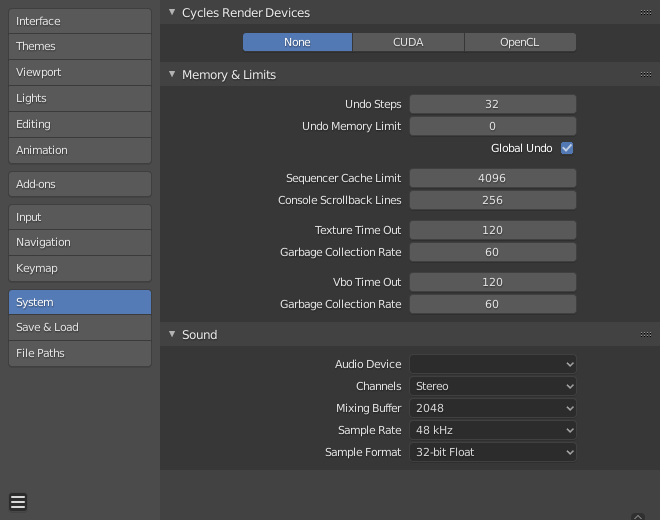System¶
The System section allows you to set graphics card options, memory limits & sound settings.
If your hardware does not support some of the options described on this page, then they will either not show up or be corrected on startup.

Preferences System section.¶
Cycles Render Device¶
Changes the computing device the Cycles render engine uses to render images. Cycles can use either the CPU or certain GPU’s to render images, for more information see the GPU Rendering page.
- None
Quand fixé à None ou quand la seule option est None : le CPU sera utilisé comme dispositif de calcul pour le moteur de rendu Cycles.
- CUDA
If the system has a compatible Nvidia CUDA device, it will show up an option for rendering with Cycles.
- Optix
If the system has a compatible Nvidia Optix device, it will show up an option for rendering with Cycles.
- OpenCL
Si le système a un dispositif compatible AMD OpenCL, il montrera une option pour le rendu avec Cycles.
Memory & Limits¶
- Undo Steps
Number of Undo steps available.
- Undo Memory Limit
Maximum memory usage in Mb (0 is unlimited).
- Global Undo
This enables Blender to save actions done when you are not in Edit Mode. For example, duplicating objects, changing panel settings or switching between modes.
Avertissement
While disabling this option does save memory, it stops the Redo Panel from functioning, also preventing tool options from being changed in some cases.
For typical usage, its best to keep this enabled.
Voir aussi
- Sequencer Cache Limit
Upper limit of the Sequencer’s memory cache (in megabytes). For an optimal Clip editor and Sequencer performance, high values are recommended.
- Console Scroll-back Lines
Le nombre de lignes, en tampon en mémoire de la fenêtre console. Utile pour les fins de débogage et le rendu en ligne de commande.
- Texture Time Out
Time since last access of a GL texture in seconds, after which it is freed. Set this to 0 to keep textures allocated.
- Garbage Collection Rate
Number of seconds between each run of the GL texture garbage collector.
- VBO Time Out
Time since last access of a GL Vertex buffer object in seconds after which it is freed (set to 0 to keep VBO allocated).
- Garbage Collection Rate
Number of seconds between each run of the GL Vertex buffer object garbage collector.
Sound¶
This panel contains the sound settings for live playback within Blender and are only available with SDL or OpenAL. To control these settings for exporting sound see the Encoding Panel and Audio Panel.
- Audio Device
Définit le moteur audio à utiliser pour traiter et produire le son.
- None
Pas de prise en charge audio (les bandes audio peuvent toujours être chargées normalement)
- SDL
Utilise l’API Simple Direct Media Layer de libsdl.org pour rendre les sons directement. Très utile pour l’édition de bandes dans le sequencer.
- OpenAL
Provides buffered sound rendering with 3D/spatial support. Used for 3D source support by speaker objects.
- Channels
Fixe le nombre de canaux audio. Les options disponibles sont : Mono, Stereo, 4 Channels , 5.1 Surround , 7.1 Surround.
- Mixing Buffer
Fixe le nombre d’échantillons utilisés par le tampon de mixage audio. Les options disponibles sont : 512, 1024, 2048, 4096, 8192, 16384, et 32768. Les tailles de tampon plus importantes peuvent causer des problèmes de latence, mais si vous entendez des clics ou d’autres problèmes, essayez d’augmenter la taille.
- Sample Rate
Fixe la fréquence d’échantillonnage <https://en.wikipedia.org/wiki/Sampling_(signal_processing)#Sampling_rate> audio. Les options disponibles sont : 44.1 Khz, 48 Khz, 96 Khz et 192 Khz.
- Sample Format
Fixe le format de l’échantillonnage audio. Les options disponibles sont : 32 bit float, 8 bit Unsigned, 16 Bits Signed, 24 Bits Signed, 32 Bits Signed, 32 Bits Float, et 64 Bits Float.